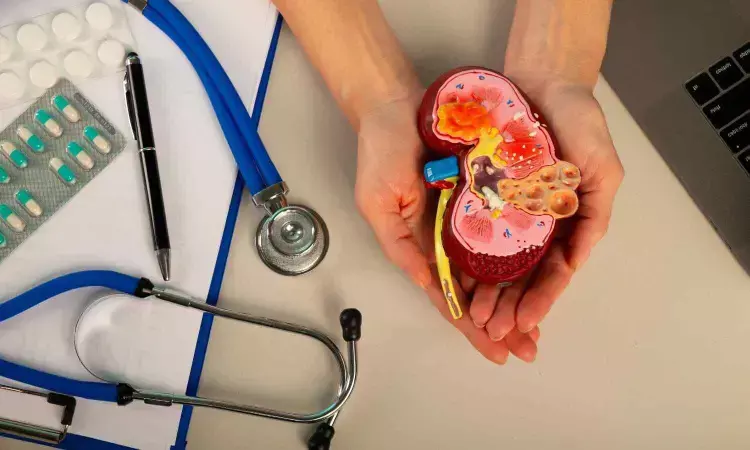- Home
- Medical news & Guidelines
- Anesthesiology
- Cardiology and CTVS
- Critical Care
- Dentistry
- Dermatology
- Diabetes and Endocrinology
- ENT
- Gastroenterology
- Medicine
- Nephrology
- Neurology
- Obstretics-Gynaecology
- Oncology
- Ophthalmology
- Orthopaedics
- Pediatrics-Neonatology
- Psychiatry
- Pulmonology
- Radiology
- Surgery
- Urology
- Laboratory Medicine
- Diet
- Nursing
- Paramedical
- Physiotherapy
- Health news
- Fact Check
- Bone Health Fact Check
- Brain Health Fact Check
- Cancer Related Fact Check
- Child Care Fact Check
- Dental and oral health fact check
- Diabetes and metabolic health fact check
- Diet and Nutrition Fact Check
- Eye and ENT Care Fact Check
- Fitness fact check
- Gut health fact check
- Heart health fact check
- Kidney health fact check
- Medical education fact check
- Men's health fact check
- Respiratory fact check
- Skin and hair care fact check
- Vaccine and Immunization fact check
- Women's health fact check
- AYUSH
- State News
- Andaman and Nicobar Islands
- Andhra Pradesh
- Arunachal Pradesh
- Assam
- Bihar
- Chandigarh
- Chattisgarh
- Dadra and Nagar Haveli
- Daman and Diu
- Delhi
- Goa
- Gujarat
- Haryana
- Himachal Pradesh
- Jammu & Kashmir
- Jharkhand
- Karnataka
- Kerala
- Ladakh
- Lakshadweep
- Madhya Pradesh
- Maharashtra
- Manipur
- Meghalaya
- Mizoram
- Nagaland
- Odisha
- Puducherry
- Punjab
- Rajasthan
- Sikkim
- Tamil Nadu
- Telangana
- Tripura
- Uttar Pradesh
- Uttrakhand
- West Bengal
- Medical Education
- Industry
Stem cells may offer new hope for end-stage kidney disease treatment, suggests research

More than 4 million people worldwide have end-stage kidney disease that requires hemodialysis, a treatment in which a machine filters waste from the blood. Hemodialysis is a precursor to kidney transplant. To prepare for it, patients typically undergo surgery to connect an artery and a vein in the arm, creating an arteriovenous fistula (AVF) that allows blood to flow through the vein for treatment. However, AVF fails about 60 percent of the time due to vein narrowing. This is a major barrier to effective treatment.
Mayo Clinic researchers found that transplanting patients' own stem cells from fat cells into the vein often helped prevent inflammation and vein narrowing. This could help millions of people with end-stage kidney disease tolerate dialysis longer, extending the time before they require a kidney transplant.
That is because these adult stem cells called mesenchymal stem cells secrete healing growth factors that appear to be effective for certain patients with an AVF, according to Sanjay Misra, M.D., a Mayo Clinic interventional radiologist and senior author of the study published in Science Translational Medicine.
"Mesenchymal stem cells have anti-inflammatory properties," he says. "Inflammation is a significant problem, especially in Western society, because it's a hallmark of a lot of medical problems: heart disease, vascular disease, hypertension, high cholesterol and cancer. They are all driven by inflammation."
Improving kidney disease treatment options
In this study, 21 participants received AVFs as part of a phase I clinical trial. Eleven participants were injected with their own fat-derived mesenchymal stem cells before AVF surgery; 10 were part of the control group. The AVFs healed faster and were more durable in most of those who received the stem cells. However, not everyone responded to them.
"We were surprised by these differences in response to the mesenchymal stem cells. This spurred us to delve further into our research and include preclinical models and RNA sequencing technology," says lead author Sreenivasulu Kilari, Ph.D.
The researchers identified specific anti-inflammatory gene factors in those who responded well to the stem cells. They say these genetic biomarkers could help predict which patients are most likely to benefit from this stem cell application and help inform personalized treatment options. The researchers hope to garner more information through larger clinical trials.
"This approach has the potential to improve outcomes for millions of patients with kidney failure, reduce healthcare costs and inform new clinical guidelines for dialysis access management if validated in larger clinical trials," says Dr. Misra.
Reference:
Sreenivasulu Kilari et al. ,Periadventitial delivery of mesenchymal stem cells improves vascular remodeling and maturation in arteriovenous fistulas.Sci. Transl. Med.17,eadp7723(2025).DOI:10.1126/scitranslmed.adp7723
Dr Kamal Kant Kohli-MBBS, DTCD- a chest specialist with more than 30 years of practice and a flair for writing clinical articles, Dr Kamal Kant Kohli joined Medical Dialogues as a Chief Editor of Medical News. Besides writing articles, as an editor, he proofreads and verifies all the medical content published on Medical Dialogues including those coming from journals, studies,medical conferences,guidelines etc. Email: drkohli@medicaldialogues.in. Contact no. 011-43720751


